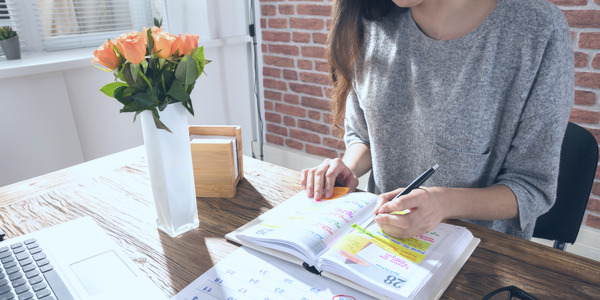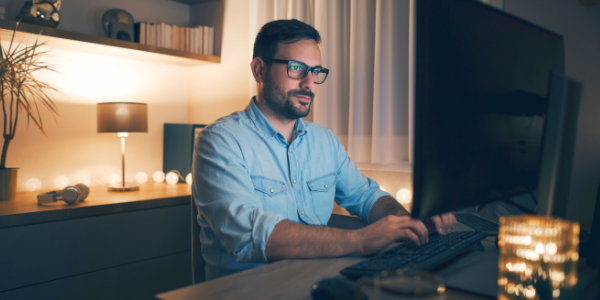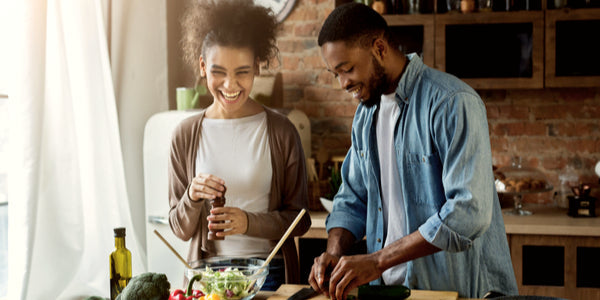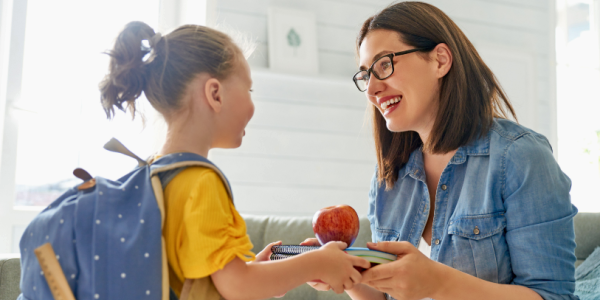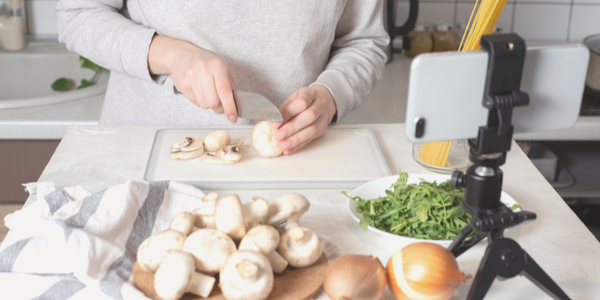
Is the idea of cooking a homemade meal intimidating? While feelings of inadequacy are common for beginner cooks, have no fear!
Now more than ever there are online resources available and simple tips to follow to help anyone improve their cooking skills, even if starting at a beginner level.
Walkthrough how to get good at cooking, no matter what level of skill in the kitchen.
5 Cooking Tips for Beginners
These cooking tips for beginners will help break barriers and grow confidence in the kitchen. The tips below specifically help beginner cooks follow a recipe, which is a great start for any cooking newbie!
1. Read Recipes All the Way Through First
One of the most basic cooking tips for beginners is to read through a recipe first. Do not just go into the kitchen and start cooking on your own (yet). Reading a recipe through first helps give an idea of what the recipe entails. It is where the ingredients and measurements are listed.
Go through the list and the cooking steps. If there is an ingredient or piece of kitchen equipment not accessible, it may mean this recipe may not be the best choice.
Also, notice the length of listed prep and cook time and determine if this fits with your timeline.
2. Prep Before Cooking
Choose a simple recipe that requires ingredients and equipment already in the kitchen. For example, scrambled eggs need eggs, some milk, salt, pepper, cooking spray or butter, a pan to cook in, and a spatula. Make sure these are all there before starting to cook.
Before starting the cooking process, do some prep work. Prepping before cooking can help the actual cooking process go smoother and seem less overwhelming.
• Clean and declutter the area used before cooking.
• Pull out all ingredients (listed on the recipe) needed and place them on the counter. This can be taken a step further by measuring out ingredients and placing them in individual containers, which is also known as "mise en place" that even high-level chefs use when cooking. The cooking technique makes adding ingredients seamless and quicker during actual cooking.
• Get needed equipment like mixing bowls, measuring cups, etc. out.
• Now, follow the recipe step-by-step.
3. Master Basics First
This may seem like a basic tip, but it is important. In order to gain kitchen confidence, stick with basic recipes first before tackling more complex dishes.
Mastering basic recipes, like scrambled eggs, baked chicken breast, or roasted vegetables, can provide a base layer of knowledge for other dishes.
Examples of recipes for beginners can be found from One Dish Kitchen easy recipes that are single serving or The Kittchen with easy recipes for quick weeknight dinners.
4. Have the Right Kitchen Equipment
Getting savvy in the kitchen does not need to mean spending a lot of money on kitchen equipment. However, it will pay off to have at least a few essential pieces of equipment for cooking. As cooking progresses, purchasing other needed kitchen equipment can happen gradually as desired.
What kitchen equipment will be best can vary depending on what recipes and foods are cooked most. For example, if rice is a staple, a rice cooker or a good pot will be important. If roasting vegetables or meats in the oven, a good sheet pan will be key.
Use kitchen equipment listed on recipes. Using a wrong size pan, pot, etc. could affect the outcome of the recipe or cause food to over/under bake.
Some staple kitchen equipment for beginner cooks that can be used for many recipes include:
• Sharp kitchen knives. Fun fact: sharp knives are actually less likely to cut than dull knives!
• Mixing bowls
• Measuring cups and spoons
• Baking pans
• Pots with lids
• Frying pan
• Cutting boards
• Can opener
• Peeler
• Slow cookers
5. Practice Food Safety
Millions of people encounter a foodborne illness each year. Keeping food safe in the kitchen is an often overlooked but important cooking tip for beginners. Knowing some basics of food safety is important to prevent foodborne illness.
The FDA lists home food safety tips including:
• Always wash food, hands, counters, and cooking tools.
• Keep raw foods apart and use separate cutting boards for raw and cooked foods.
• Cook foods to safe temperatures.
• Abide by the two-hour rule. Put foods in the fridge or freezer within 2 hours after cooking or buying from the grocery store.
How to Get Good at Cooking
Once basic cooking techniques and recipes are familiar, cooking skills will continue to evolve. In order to get good at cooking, keep practicing and experimenting. Even if something does not come out as expected, it is still a learning process!
Meal Prep
Meal prepping is a way to make cooking more convenient throughout the week. Meal prepping is planning out meals for the week, shopping for ingredients with a list, and "prepping" ingredients. Meal prepping can be done any day of the week, but most typically prefer on the weekend.
Meal prep takes some organization and planning which may seem like more work. However, planning out meals ahead of time takes the guesswork out of deciding what is for dinner every night.
Meal prep gets easier and more rewarding the more it is done. When first starting meal prep, start small. For instance, start with one recipe for one day of the week and meal prep more as comfort level increases.
Examples of meal prep can include:
• Chop vegetables for a recipe and keep in a sealed container in the fridge. When these veggies are needed for cooking throughout the week, simply pull from the refrigerator already chopped.
• Making rice ahead of time to have available for recipes throughout the week.
• Making a meal ahead of time and storing in the fridge or freezer in individual portions.
• Having leftovers for lunch or dinner from a meal the day before.
Watch Cooking Videos
Visually seeing someone cook a recipe can be helpful. Watching cooking videos can help one learn a new basic technique or cook with an unfamiliar ingredient. It may also help show a way to cook more efficiently or safely.
As more people are cooking at home from the pandemic, cooking videos and other online resources are increasingly available to help people grow in cooking. Online cooking classes are also growing in popularity and can be a fun, interactive way to get good at cooking.
Practice, Practice, Practice
Just like riding a bike or learning a new skill, the only way to really get better with cooking is to keep practicing. Try new recipes while implementing the same cooking tips for beginners.
Even if a recipe does not turn out, no problem! Learn from mistakes and try again.
Summary
Beginner cooks have no need to be intimidated by the kitchen. Following cooking tips for beginners can raise kitchen confidence and mastery of basic recipes.
The key for progress is to follow recipes, read them through before beginning, prep the area before starting the cooking process, and follow food safety practices. Make sure there is proper kitchen equipment before cooking.
Once certain basic recipes are "mastered", continue to get good at cooking by practicing new recipes, watching cooking videos, and incorporating meal prep. Before long, the term beginner will not fit!

